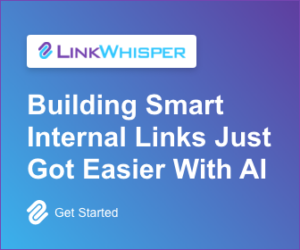How Much Does It Cost To Start A Website?
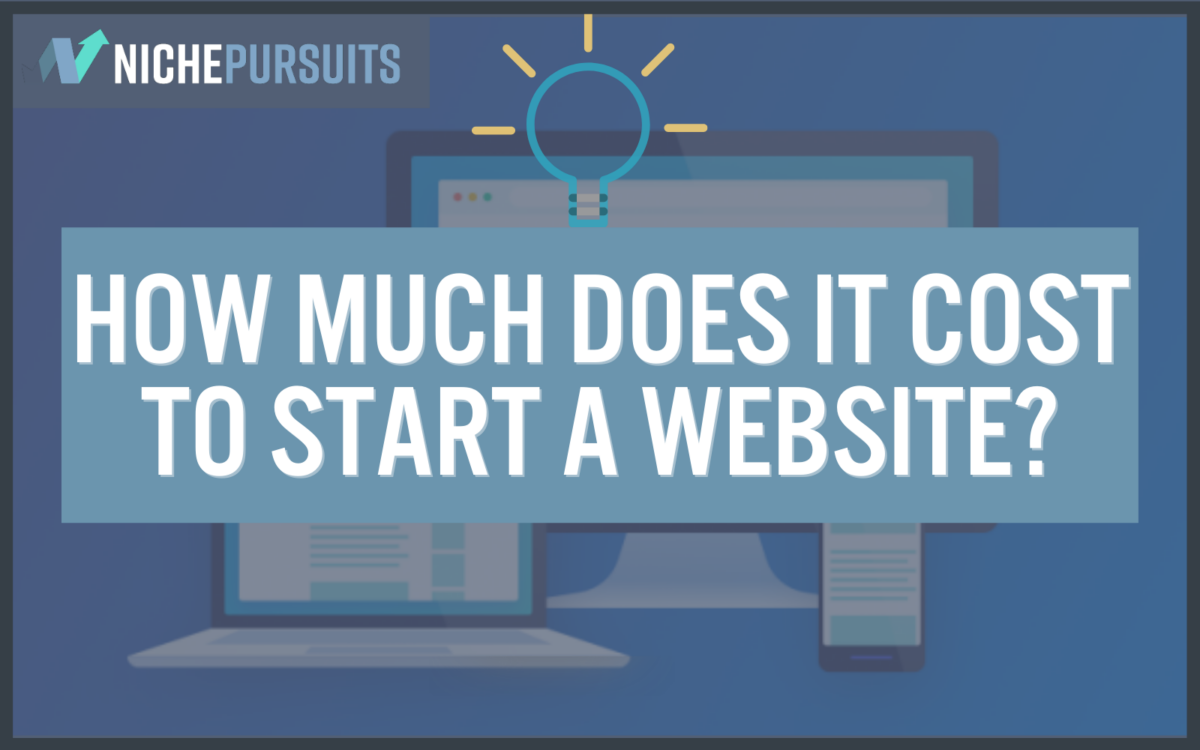
When you buy something through one of the links on our site, we may earn an affiliate commission.
How much does it cost to start a website is one of the main questions I get asked by new niche website builders all the time.
It's a good question.
And one you need to know the answer to before you even start to think about building a website.
Imagine realizing after a couple of months that you can’t afford to carry on — preparation, time, dreams, and money, all wasted!
It happens.
However, if you’re prepared and know the costs involved from the start, you can avoid these unnecessary consequences and not have to worry about this happening to you.
In this blog post, I will show you exactly how much it costs to start your website. I’ll break down the expense for the essential tools and software you need at a minimum.
This way, you’ll know the financial requirements before you begin.
By the time you've finished reading, you’ll know what’s involved, what’s needed, and more importantly, you'll know if you can afford to carry on.
Let’s get to it.
Contents
- Is It Free To Start A Website?
- 6 Best Options To Build A Website
- What Are The Minimum Requirements To Build A Website?
- How Much Does It Cost to Launch A Website? (Extra Expenses)
- Website Example Costs Breakdown.
- Can I Buy A Ready-Made Website?
- What Is The Absolute Cheapest Way To Start A Website?
- What’s the Best Cost-Effective Option For Starting A Website?
- How Much Does It Cost To Start A Website (Final Thoughts)
Is It Free To Start A Website?
You can start a website for free, but this isn't the recommended approach for most people.
Website builders like Weebly, Strikingly and Wix offer free plans, but these (free) plans come with certain restrictions and requirements.
For starters, If you don't use their premium service, you'll be using a subdomain, which isn't professional and looks long and unsightly.
In addition, the free plans on most website builders also feature adverts on your website, which you have no control over.
There are many other reasons to avoid free website builders, which I won't go into too much in this article, but the answer to your questions is yes, you can start a website for free.
However, you should only do this in certain circumstances.
These circumstances are typical:
- Students who want a free website for a project
- Children looking for a free online presence
- Testing purposes
- Low-key hobby websites
6 Best Options To Build A Website
If you've decided that you want to build a professional-looking website, and the free options aren't what you need, then you're going to want to use one of the six options below.
These options have the ability for you to create a website to suit your needs and requirements perfectly.
Let's start with the most popular of them all.
WordPress (Popular Website Creation Option)
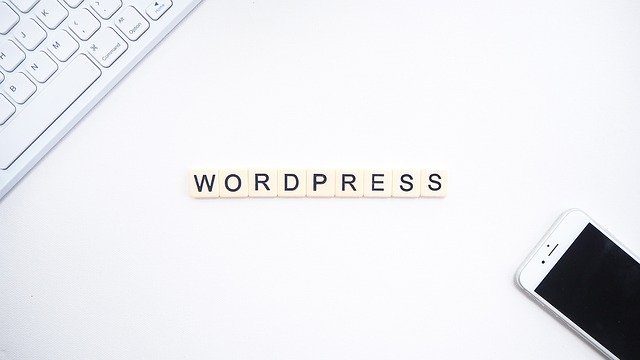
WordPress is a user-friendly open-source content management system (CMS) that combines PHP with an MYSQL or Maria DB database to display your website.
It's popular with millions and thought to run 40% of all websites in the World. A recent article on Kinsta reports that more than 500 websites launch each day using WordPress.
Compare this with Squarespace and Shopify, which launch around 60 sites per day.
WordPress first launched in 2003 and has gone from strength to strength. The blogging platform is a massive success story mainly due to the software's easy-to-use features and SEO benefits.
The blog you're reading this article on uses WordPress, as are most other websites you visit.
You can use WordPress plugins and themes to enhance your website creation. In addition, the support network is vast, with help and advice available through many platforms.
If you purchase a premium theme, typically, you will receive enhanced support for at least 12 months, and likewise with a premium WordPress plugin.
Although WordPress is free and open-source, to use it on your website will require web hosting and a domain name (more on this later)
Wix (Web Building Software)
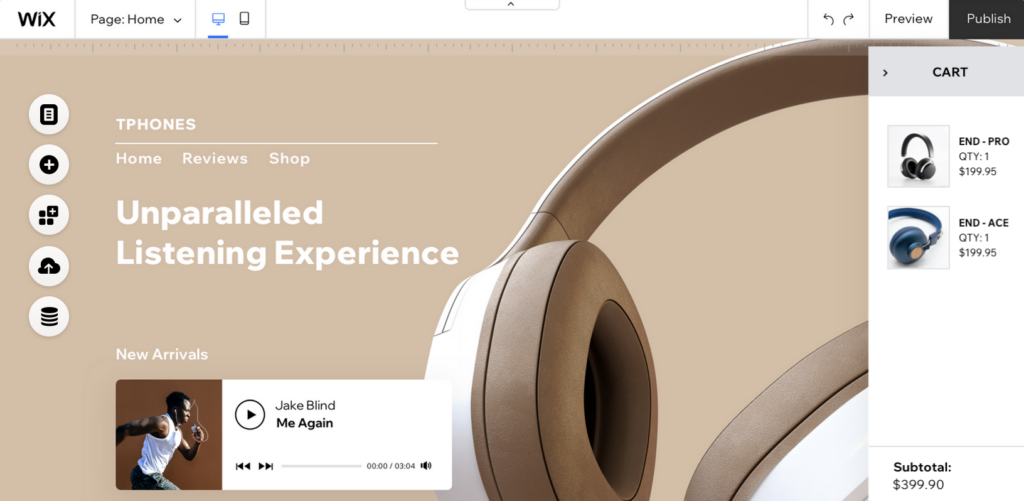
Wix is a website builder that provides a cloud-based service for you to build your website.
They make it pretty easy for you to create an HTML5 website using advanced features and website templates.
The process to create a website with Wix is easy; you simply :
- Choose a template for your website from the web design template library.
- Customize it to your satisfaction
- Answer a few fundamental question
- Add your domain name
- And that's it, like magic, you have a live website
They offer good support, app integrations, and numerous helpful web building features to use on your website.
As mentioned above, Wix has a free plan. However, to eliminate adverts, use your own domain name, plus get access to the premium web design features, you're going to have to sign up for one of their premium plans.
There are four premium options available for their website plans — they start from just a few dollars per month.
In addition, they also have three plans for a small business website with eCommerce functionality.
Their premium plans come with 24-7 support; however, the VIP plans provide priority support and social media logo design options.
Weebly
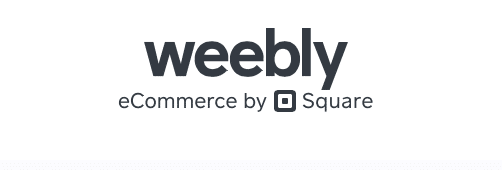
Weebly is another website builder option for simple website design and building websites for almost any business.
This option is a popular choice for a small business that wants eCommerce functionality.
Like most website builder solutions, they offer templates, drag and drop editors, and a host of added features and benefits.
Weebly offers two pricing options, one for websites and the other for online stores. The website options offer a free plan, including ads, SEO support, but no premium features.
If you want to use Weebly to build a professional site or an online store, you should consider their premium plans.
Weebly is suitable for website creation with marketing features, full support, and ease of use when starting a website.
Free hosting comes with all plans.
Get a Free Domain with Weebly HereShopify

Shopify is a solution for those who want to build an online store. It's one of the most effective eCommerce platform options online.
The ease of use and handy features are why so many online store owners are using their software.
You can list your products, take payments, write blog posts, and use the available add-ons to enhance your business marketing efforts and increase sales.
They offer the fundamental basics needed to get started online and offer a 14-day free trial.
Shopify comes with added marketing features, support, and templates that are perfect for a small business website, and also well-established online stores.
You can read our unbiased review of Shopify here.
Try Shopify Right HereSquarespace

Squarespace (check out Square vs Squarespace) is another option to build a website. The company has been around since 2004 and provides a drag and drop website builder known all over the World.
If you want to build a website, membership site, online store, or professional portfolio site, Squarespace is a good option.
They have fantastic designs, SEO tools, advanced features, and many other tools and features to build a perfect website for your needs.
With email marketing, social media tools, and a new video maker available, you can see the attraction for those who want a simple website builder to create their online sites.
Squarespace offers a free trial for all new users to test out their software.
Web Developer & Web Designer

The final option to create a website is to use a web developer. Unfortunately, this option is the most expensive and can cost you anything from $500 to $1000 or more.
The benefit of using a web developer or web designer is that you can work with them on the design of your website and create a unique site.
While the options above use ready-made templates that thousands of people use daily, with a web developer, the template and central theme of your website, online store, or blog can be a one-off design that only you have.
Using a web developer is an excellent option if you want to stand out.
However, the costs are high, and finding a super talented website developer can be challenging. This is why many people choose one of the other five methods above when building a website.
In addition, WordPress now uses Gutenberg, an in-built theme builder that adds functionality for anyone wanting to design and develop their website to their liking.
You also have premium WordPress themes like Generate Press, Divi, Astra, Kadence, and a few more that have been developed to give you the freedom to design your own style.
While web developers still have their uses, it’s not a definite requirement anymore for those with smaller budgets.
What Are The Minimum Requirements To Build A Website?
Now that you know the main options for building a website let's move on to what you need at a minimum to get a website up and running.
Domain Name
The first thing you need is a domain name — Namecheap offers these for around $10.
If you're not sure what a domain name is, then it's the URL of your website.
For example, the domain name for this website is:
www.nichepursuits.com
If you visit Google, their domain name is Google.com, and likewise if you visit any other website.
The URL is typically the name of the website.
See the images below for a few examples.

This image displays the domain name for Squarespace.
And the next one is for Motion Invest:

You can buy a domain name with many extensions, with the most popular of them all being the .com option.
The typical price for a domain name is around $10, and you can spend much more if you require a domain name that's not available.
For example:
Say your website is called “Content Marketing” you search for the domain name but notice it's gone; however, you also see that the owner is selling the domain name.
Because “contentmarketing.com” is a popular name, the owner is selling it at a premium price. The domain name owner knows that someone who wants to build a website about “Content Marketing” will likely pay a premium if they can afford it.
Buying this is excellent if you have deep pockets because you get the perfect domain name; however, this can cost you between $500 and a whole lot more.
While you would probably be looking at a few thousand dollars for a premium domain, they can be sold for much more, with the record being held at $872 million!
That's not a typo — $872 million for the domain name cars.com.
The thing to remember is that you can get a domain name for ten bucks, which is fine for 99% of us, but if you want an exact match domain for your brand, you'll likely have to pay more.
Hosting

Hosting is required to host your website files and will be the main driving force behind your website.
You have a couple of options available, but typically, you will likely choose shared hosting when starting your first website.
When your website gets popular, you can upgrade to a VPS or a more advanced cloud solution.
You will only need hosting if you are building your website with WordPress or HTML style options. Hosting isn't required if you're using a website builder like WIX, Weebly, or Squarespace.
However, most people purchase hosting and create their websites using WordPress for a more robust and faster option.
Bluehost is a good option and offers shared hosting for a few dollars per month. Bluehost has been around for many years and has been recommended as a host to use by WordPress themselves.
Another option is Big Scoots which has some great prices, good support, and fast servers.
If you're looking for a more specific WordPress-only premium option, you can also use the likes of WP Engine and Kinsta.
These two options are for WordPress only and provide a fast, secure service for those with or those who intend to have many website visitors.
The downside to WP Engine and Kinsta (check out our Kinsta review) is that they are more expensive.
How Much Does It Cost to Launch A Website? (Extra Expenses)
We've touched on the minimum requirements needed to start a website above, but in reality, there are more expenses involved when creating your site.
Depending on your needs, the cost can escalate quickly, so it’s essential to be aware of these before starting out.
Let's take a look at the further expenses you may incur.
Legal Policy

If you're creating a website that sells a product, service, or one that promotes an event, then you're going to have to display some legal documents to stay compliant.
Here's a few examples of the legal policies you may need:
- Privacy Policy/Cookie Policy. These policies are necessary to inform your website visitors about the data and personal information you collect on your website.
- Affiliate Disclosure. You'll need to have an affiliate disclaimer to stay compliant with the affiliate programs and marketplaces you're promoting.
- Terms & Conditions notice. This policy will lay out the terms and conditions of using your website.
You can create these policies by yourself (if you know how), or you will pay someone to do them for you.
Typically the costs vary, with an online legal policy generator costing around $40, or you can get your legal representative to write one up for you, which will cost significantly more.
There are free options available for legal documents, but you will need to link back to the provider, and some features may be missing.
You will also need to make sure that they are compliant with your needs.
SSL Certificate
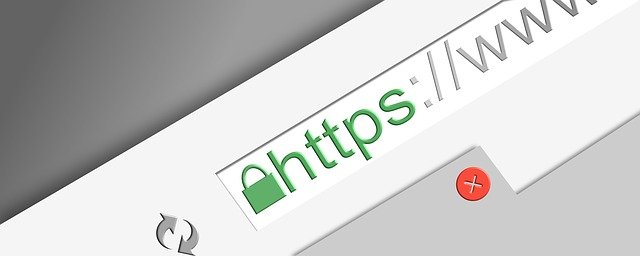
SSL certificates will offer a secure layer of protection to your domain names and websites. It’s also the reason why a website displays ‘HTTPS ‘before the domain name.
Any site displayed as ‘HTTP’ has not got an SSL certificate, or the one they have has expired.
Google started using SSL (secure sockets layer) security as a ranking signal back in 2014.
As a result, any website without an SSL certificate would find it harder to rank higher than sites with one. A lot of websites that didn’t have one at the time saw a drop in rankings overnight.
There are a few paid SSL certificates available, with the common ones being:
- Positive SSL
- Instant SSL
- Positive SSL Wildcard
- Premium Wildcard
A free option (Let's Encrypt) is available with most hosting companies, and you can also purchase a paid SSL certificate online from sites like Comodo and DigiCert or through one of the many domain name registrars.
Depending on your needs, an SSL certificate can range from free to a few hundred dollars per year.
If you’re running an eCommerce store and using your own payment processors, a paid option is recommended; however, a free option is suitable for most blogs — and you will still get the locked padlock symbol next to your domain name.
Autoresponder
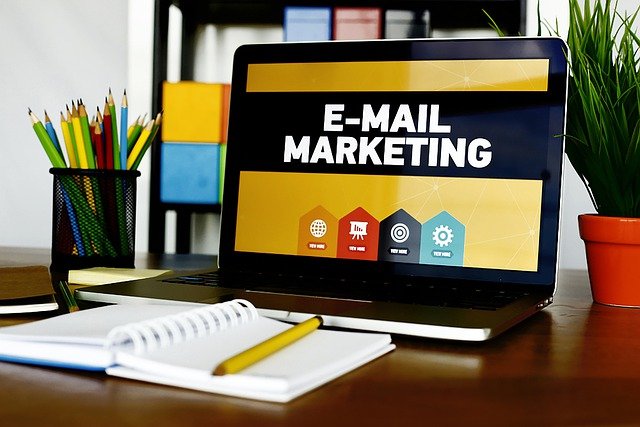
Ask any marketer, and they will tell you that an autoresponder is one of the most critical assets for their business.
Keeping in touch with your readers and customers is a great way to market your products and services and also provides you with a free traffic source whenever you need it.
You have several options, such as Convert Kit, Active Campaign, and Aweber.
Typically the price starts around $15-$29 per month and will rise once you get more subscribers.
There are also free plans available, but these tend to come with restrictions and adverts.
A typical price breakdown for Convert Kit is displayed in the table below:
|
Convert Kit Pricing Example |
||
|
Subscribers |
Price (Per Month) |
Reduced Features |
|
0-300 |
Free |
Yes |
|
300-1000 (Creator Plan) |
$29 |
Yes, but more than Free Plan |
|
300-1000 (Creator Pro Plan) |
$59 |
No |
|
5000 (Creator Plan) |
$79 |
Yes |
|
5000 Creator Pro) |
$111 |
No |
These price increases are typical of most autoresponder services online. The more subscribers you have, the more the cost.
Business Email

A business email will make you look more professional towards your clients and offer extra security, faster delivery, and more storage space.
You can get started with a business email service for around $5 per month.
Below are three popular options.:
- Bluehost Email
- Google Workspace
- Office 365
You can also get a business email service from most hosting and domain name suppliers. Again, the pricing starts from free to around $10 a month.
WordPress Themes Cost

If you use WordPress (most do), you will likely be using themes for your website. There are thousands of themes to choose from, but ideally, you’ll want to select one of the better options for your website.
Although you can use free WordPress themes, the chances are that you'll want to use some of the better WordPress themes with more features.
These are called premium themes, and the prices vary, but as an estimate, you're looking at around $40-$60 per year.
WordPress Plugins Cost
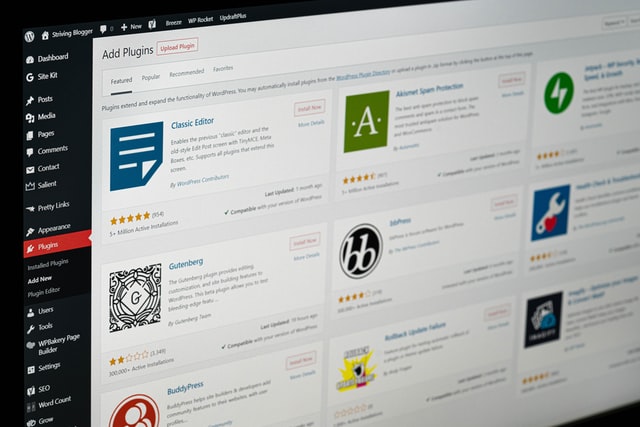
WordPress plugins are a way to enhance your WordPress site. Many are free to use, but some premium plugins come at a cost.
For example, a few of the popular premium plugins can find below:
- WordPress Rocket. This plugin will help you speed up your website's loading time and cost $49 per year.
- Yoast Premium. Yoast is a great free SEO plugin, but they also offer a premium version that comes with added features — this will cost you $89 per year.
- Elementor Pro. This plugin is an advanced page builder plugin for WordPress; it helps you build a website to suit your needs without messing around with code. The plugin will cost you $49 per year.
- Sucuri. This is a security plugin that will help you to secure your website from hackers and viruses. The premium version costs $199.99.
There are hundreds of premium plugins available, and depending on your needs, this might be an added cost to your website.
Investing Costs

Investing money isn't necessarily an expense needed to start a website, but it is related to website building if you're going to scale your business one day.
Say you wanted to put together a writing team for your website, you would need to invest money to pay and find writers.
You're probably looking at paying a decent writer at least 6 cents per word and much more for the outstanding ones.
This can be costly, so you need to be aware of this website cost if you’re thinking of going down this route.
Other investments include link building, software creation, images, web developers, and marketing costs.
One more investment option is when people take a hand-off approach to building a website.
For example, you can use a service like Brand Builders; that will cost you $500 to $2000 per month.
This approach will get you content, links, SEO, monitoring, and various other features created and carried out by a third party.
If you’re too busy to maintain the website yourself, then this could be a cost to think about.
Website Example Costs Breakdown.
You now have a rough idea of some of the costs involved when creating a website. Let's now put them together as examples of starting up a website with various add-ons and tools.
Side note: You can split some of this cost into monthly payments.
Example One (WordPress Estimated Cost)
For the example, this website includes:
- domain Name
- Hosting
- SSL Certificate
- Business email
- Autoresponder
- Legal policies.
- Free WordPress Theme
- Free Plugins
The minimum cost to start this website would be $429 per year.
A domain name costs $10, and you can get hosting for around $59 per year. An autoresponder will cost roughly $300 per year, business email $60 per year, and the legal policies, themes, plugins, and SSL certificates are free with this example.
The above are the basic costs for a cheap to run website. You can make it even less expensive by using a free plan for the autoresponder, so you could effectively knock $300 of the starting cost, which leaves $129 to start a website — pretty cheap.
However, once you reach 300 subscribers, the price will rise.
Example Two (WordPress With Premium Themes & Plugins)
The cost for this example includes everything in example one, but also a premium WordPress theme and two premium plugins,
An estimate for this setup would be around $588.
The cost for the premium theme would be $60 and $99 for the two plugins.
Example Three (eCommerce Website Using Shopify)
This example is not using WordPress but will instead be using Shopify. Additionally, it will feature a domain name, paid SSL certificate, and an autoresponder.
Some would describe this as the bare minimum for starting an online store using Shopify.
The estimated cost would be $718 per year.
That’s $348 per year for Shopify’s cheapest plan, $300 for autoresponder, $10 for a domain, and $60 for an SSL certificate.
Example Four (Wix Website Builder Cost)
Let’s assume you’re using the basic business plan on Wix, with no autoresponder, but you will be using your own domain name and legal policies.
This is the price breakdown:
- $204 per year for the basic business plan
- Paid Privacy Policy $40
- $10 Domain Name
You would be able to get going on Wix for $254 per year.
Example Five (Hands Of Approach Cost)
The final example is a website where you don't create any of the content yourself. Yes, you pay writers to do it for you.
Let's say you have seven articles (3000 words for each one) created every week, and you pay the writers 6 cents per word.
This approach would cost you $1260 per week just for the content. Add the domain name and autoresponder, business email, etc., and you're talking about $5.500 per month.
Of course, this won’t apply to most people when starting, but these are the estimated figures if you were to use this approach.
Can I Buy A Ready-Made Website?
When answering the question — how much does it cost to start a website? Most of the information was focused on you creating the content yourself and starting a brand new website.
However, you can get started by buying a brand new website with cash.
You can buy a vetted website on sites like Motion Invest, for example, for a few thousand dollars.
This website would already have content and be earning money, so all you would need to do is continue to add content.
If your finances permit, then buying a website is an option.
For example, below is a recent website available on Motion Invest for sale:
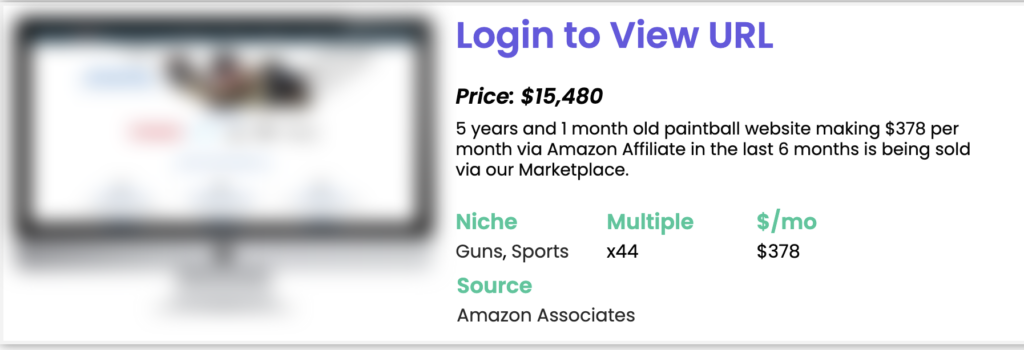
This website is available for $15,480 and makes $378 each month.
If you were willing to buy this site, and scale it up and add other monetizing methods, then you could potentially get your money back relatively quickly.
What Is The Absolute Cheapest Way To Start A Website?
The method below is the cheapest way to start a website online with WordPress. When I say to get started, I mean the cost for the first month.
With this method, you can get going for less than $17, and this includes an autoresponder, legal policies, domain name, and SSL.
Here’s the process.
- Get your domain name from Namecheap for around $9
- Hosting from BigScoots for $7.99 per month.
- Free Privacy Policy from WordPress or free online generator
- Free autoresponder plan on Aweber or Convert Kit
- Let’s Encrypt Free SSL from BigScoots
That’s it.
You can be up and running in your first month for less than $17. The second month could be $7.99 if you’re still under the free subscription numbers for the autoresponder.
This approach is suitable for those on a low budget, and once you start earning from your website or your finances improve, you can scale your website and upgrade your services.
Can I Get Started For Free?
Yes, but you will have limited features.
You could create a free account on Weebly and use their branded subdomain name. You still get SSL, and you can still monetize your site with the likes of Google Adsense.
As for an autoresponder, use the free plans on Convert Kit or Aweber, and you get your legal policy for free online.
Having no money isn’t a major issue when starting a website; of course, I recommend a different approach, like the ones mentioned in this article, but if you genuinely can’t afford to get started, then maybe try Weebly (and check out our Weebly review to learn more).
There’s also Webador and Wix that offer free plans for website builders.
What’s the Best Cost-Effective Option For Starting A Website?

The best website cost-effective option depends on your needs.
If you’re a small online business that wants an essential website, you could go with WordPress, using free plugins, themes, and free email software, or use one of the website builders mentioned above.
Alternatively, if you have an eCommerce store, then Squarespace or Shopify will suit you better. You can get free trials for both of them, and their cheapest plans are pretty affordable.
It really does depend on your needs.
All of the start-up methods mentioned in this article are good options; you just need to find out which is best for you and your budget.
How Much Does It Cost To Start A Website (Final Thoughts)
So, there you have it.
You now have a better idea of how much it will cost to start a website.
You can take the popular route (WordPress or Web Site Builders), which most people do, and get going for a couple of hundred dollars per year, or you can take the extreme option and spend a few thousand bucks.
There’s even an option to get going with no money at all.
Squarespace and Shopify will probably be preferred if you build an eCommerce store, but WordPress is the popular choice for most other websites.
Want to learn step-by-step how I built my Niche Site Empire up to a full-time income?
Yes! I Love to Learn
Learn How I Built My Niche Site Empire to a Full-time Income
- How to Pick the Right Keywords at the START, and avoid the losers
- How to Scale and Outsource 90% of the Work, Allowing Your Empire to GROW Without You
- How to Build a Site That Gets REAL TRAFFIC FROM GOOGLE (every. single. day.)
- Subscribe to the Niche Pursuits Newsletter delivered with value 3X per week
My top recommendations










